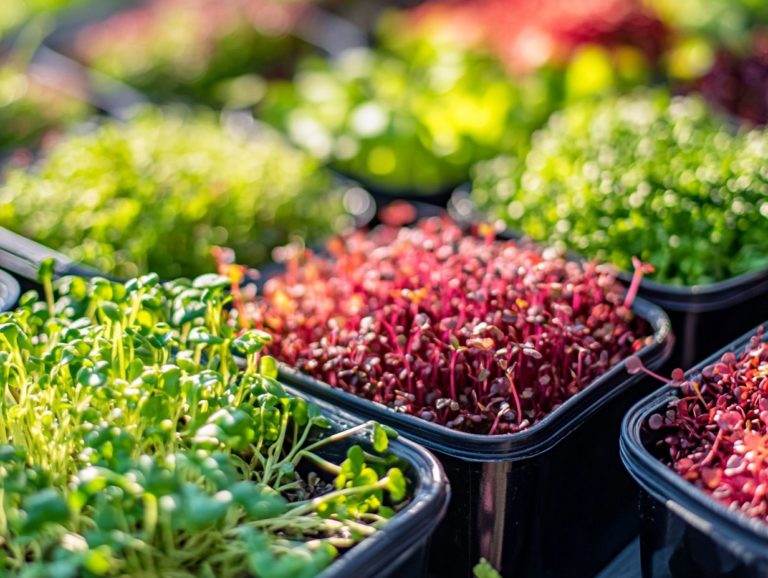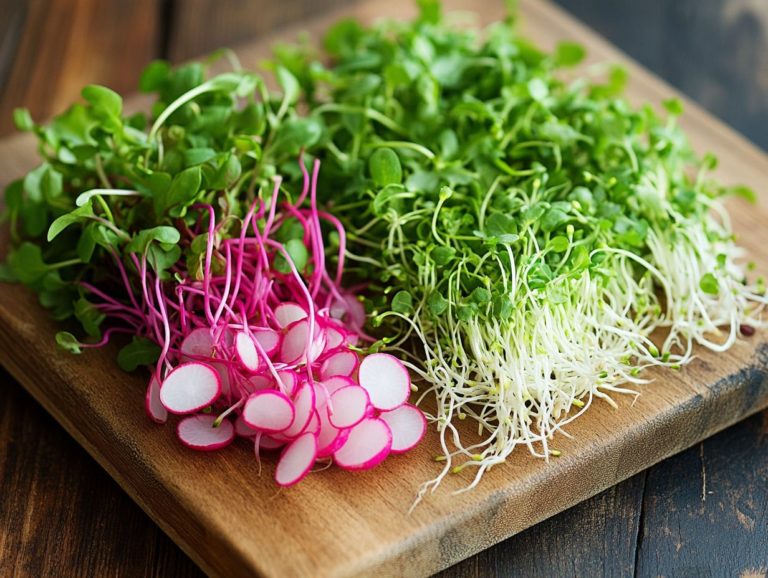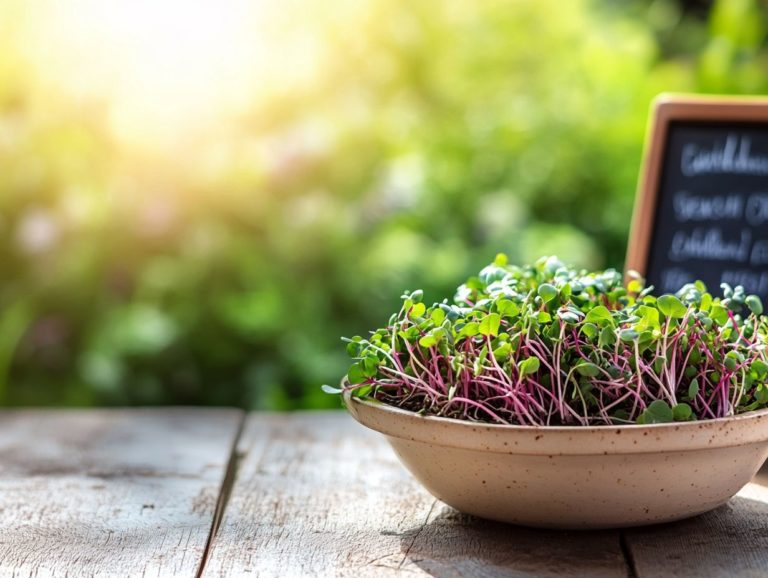Microgreens and Their Benefits for Pregnant Women
Microgreens are tiny, nutrient-packed powerhouses that can significantly benefit your health, especially during pregnancy.
Loaded with vitamins and minerals, these little greens are essential for supporting both your well-being and that of your developing baby. This article delves into the nutritional advantages of microgreens, highlighting their importance for expectant mothers, along with practical suggestions for incorporating them into your diet. It also covers essential precautions to ensure safety during this crucial time. Explore how these vibrant greens can elevate your pregnancy journey!
Contents
- Key Takeaways:
- Why Microgreens are a Must-Have for Your Health!
- Why Microgreens are Beneficial for Pregnant Women
- How to Incorporate Microgreens into a Pregnancy Diet
- Precautions and Considerations
- Frequently Asked Questions
- What are microgreens?
- How do microgreens benefit pregnant women?
- What specific nutrients do microgreens provide for pregnant women?
- Are there any risks to consuming microgreens during pregnancy?
- How can pregnant women incorporate microgreens into their diet?
- Are there any specific microgreens that are particularly beneficial for pregnant women?
Key Takeaways:
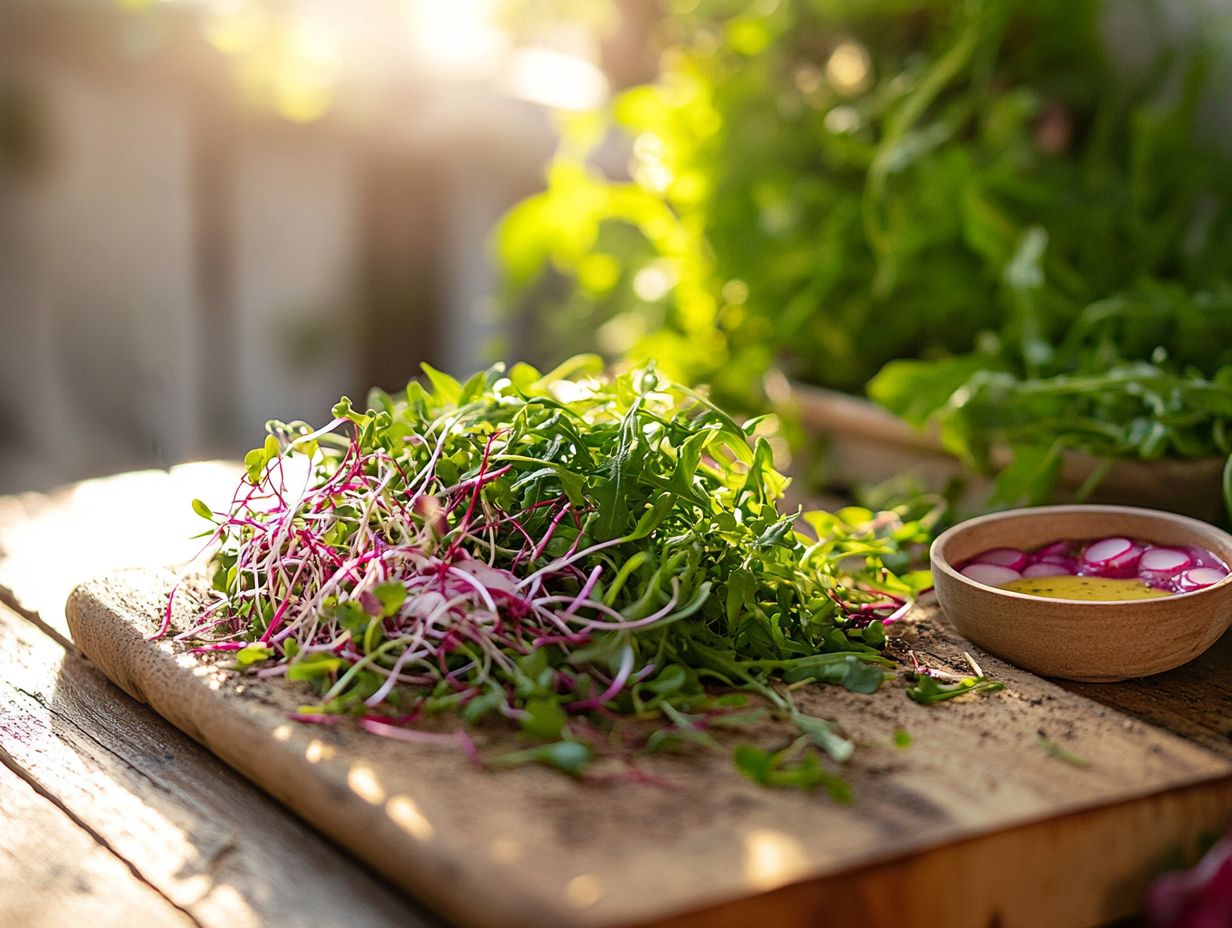
- Microgreens are nutrient-dense, young plants packed with essential vitamins and minerals for pregnant women and their growing babies.
- Incorporating microgreens into your pregnancy diet can boost your immune system, increase energy levels, and support fetal development.
- Pregnant women should consult with their healthcare provider and practice food safety precautions when adding microgreens to their meals.
What are Microgreens?
Microgreens are young, vibrant plants harvested just after their first true leaves emerge. They include a diverse array of vegetables, with standout options like broccoli sprouts, red cabbage, and fenugreek, which are part of the Brassicaceae family.
These nutrient-dense gems are celebrated for their striking colors, zesty flavors, and impressive health benefits, including a bounty of vitamins, antioxidants, and essential minerals.
Grown in controlled environments that amplify their flavors and nutrients, microgreens are enticing for those prioritizing health. You can cultivate these wonders indoors or outdoors, using methods from traditional soil-based systems to innovative hydroponics (growing plants without soil), depending on your preferences and space constraints.
Varieties such as basil, cilantro, and arugula contribute unique tastes and textures that elevate everyday dishes like salads, sandwiches, and garnishes.
Unlike their mature counterparts, microgreens deliver an intense burst of taste that can transform even the simplest meals. Their delicate leaves provide a satisfying crunch, making them a favorite for chefs and home cooks looking to infuse color and nutrition into their culinary creations.
Why Microgreens are a Must-Have for Your Health!
The nutritional benefits of microgreens are truly remarkable. These diminutive plants are brimming with vitamins, minerals, and antioxidants, making them a formidable ally in your diet.
Research shows that incorporating microgreens can tackle issues such as iron deficiency, heart disease, and insulin resistance. They also deliver beneficial compounds like polyphenols and dietary fiber, supporting various bodily functions.
Embracing microgreens can be a great step toward a healthier lifestyle.
Key Nutrients for Pregnant Women
For expectant mothers, microgreens serve as a treasure trove of essential nutrients critical for maternal well-being and fetal development. They are rich in folate, calcium, and iron, addressing common deficiencies during pregnancy.
The concentrated nutritional profile of microgreens provides a powerful source of vitamins and minerals, promoting a healthy pregnancy and optimal growth for your baby.
Take broccoli microgreens, for instance; they deliver a boost of sulforaphane, which may protect against complications during pregnancy. Sunflower microgreens are fantastic sources of vitamin E, promoting the mother’s skin health, immune function, and supporting the baby’s development. Incorporating these greens into your diet allows you to enjoy the benefits of eating microgreens daily.
With high antioxidant levels, various microgreens can also help reduce inflammation, a common concern among pregnant women. By adding these nutrient-dense greens to your diet, you can significantly enhance your overall nutritional intake, paving the way for a smoother pregnancy journey and a healthier start for your child.
Ensure to wash microgreens thoroughly before consumption to maintain safety.
Try adding microgreens to your meals today for a health boost!
Why Microgreens are Beneficial for Pregnant Women
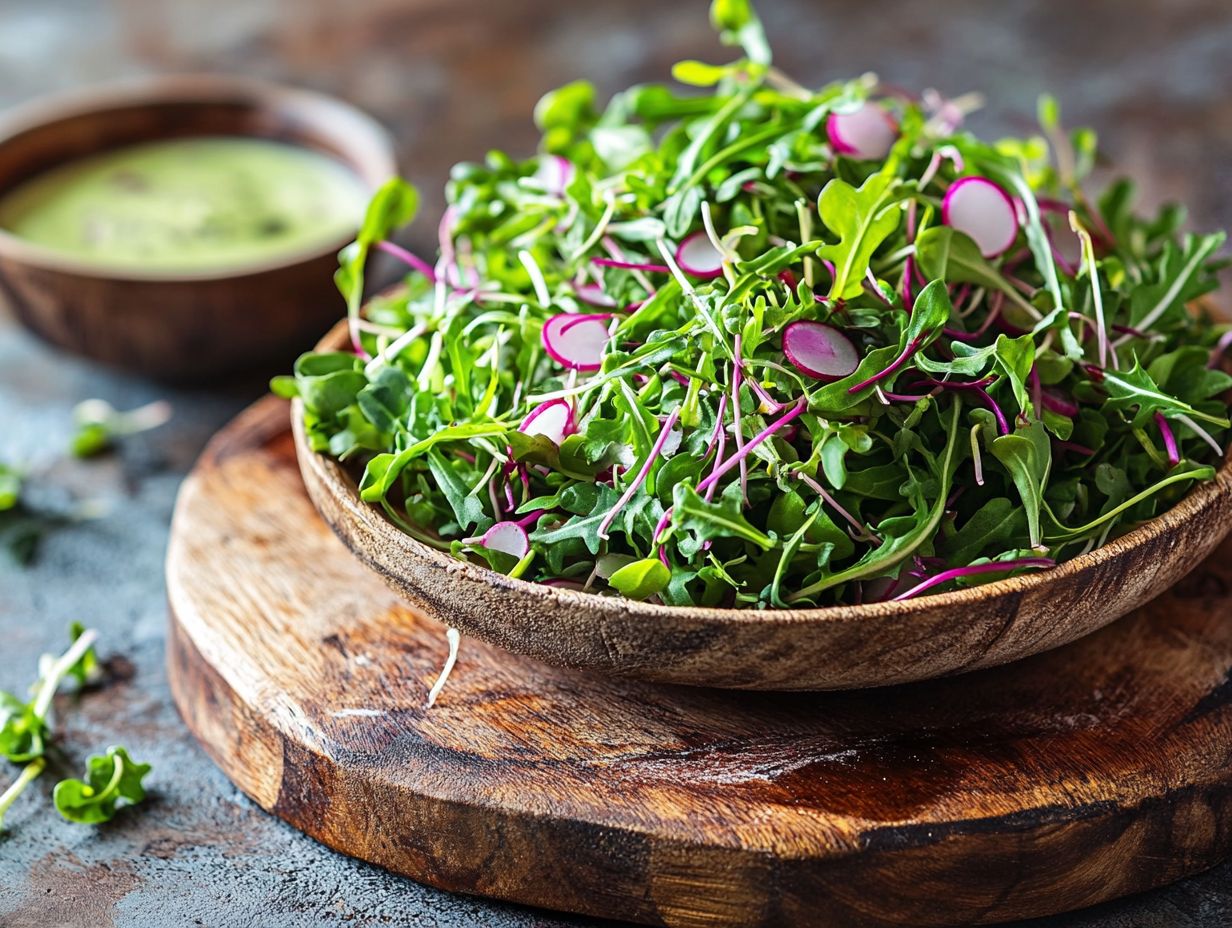
Microgreens offer many health benefits for pregnant women. They are a key part of a balanced diet during this important time in your life.
These plants are rich in essential nutrients like folate, calcium, and iron. They help prevent deficiencies and boost your meals’ overall nutritional quality.
You can improve your digestive health with their fiber content. This supports both your health and your developing child while helping to prevent insulin resistance.
Boosting Immune System and Energy Levels
Microgreens are a fantastic choice for enhancing your immune system and boosting your energy levels, especially during pregnancy when optimal health is paramount. Packed with high concentrations of antioxidants and essential nutrients, microgreens play a vital role in fortifying your body s defenses against illnesses.
Broccoli and spinach microgreens are excellent choices for their impressive vitamin C and E content, which works wonders for immune function and helps combat oxidative stress damage to cells that can affect health. Nutrient-dense options like beet and Swiss chard microgreens deliver essential vitamins that support energy production.
To easily incorporate these nutritional powerhouses into your meals, consider these simple ideas:
- Toss microgreens into your salads for a fresh crunch.
- Blend them into your smoothies for a vibrant boost.
- Use them as a lively topping on sandwiches and wraps.
With each bite, you ll be ensuring a delicious and nutritious enhancement to your diet.
Supporting Fetal Development
Microgreens are essential for supporting fetal development, offering a wealth of nutrients that are vital for your baby’s growth and health. They are rich in folate, which helps reduce the risk of neural tube defects, and iron, crucial for oxygen transport. These nutrient-dense plants make a perfect addition to your pregnancy diet.
Beyond folate and iron, microgreens are brimming with vitamins A, C, and K, all of which play significant roles in boosting immune function and supporting bone development. Vitamin C enhances iron absorption, further facilitating oxygen transport for your developing fetus. The high antioxidant content in these tiny greens helps combat oxidative stress, promoting overall maternal health. Additionally, understanding the role of microgreens in healthy eating emphasizes their importance in a balanced diet.
Adding a variety of microgreens to your daily meals, including options like broccoli sprouts and red cabbage, diversifies your nutrient intake and creates a nurturing environment for your baby’s growth and development.
How to Incorporate Microgreens into a Pregnancy Diet
Incorporating microgreens into your pregnancy diet is simple and incredibly versatile. They offer a delightful enhancement to various meals and recipes.
Whether you re adding them to salads, blending them into smoothies, layering them in sandwiches, or stirring them into soups, the possibilities for enjoying microgreens are virtually endless. This makes it effortless to savor their health properties while crafting delicious, nourishing meals.
Recipes and Meal Ideas
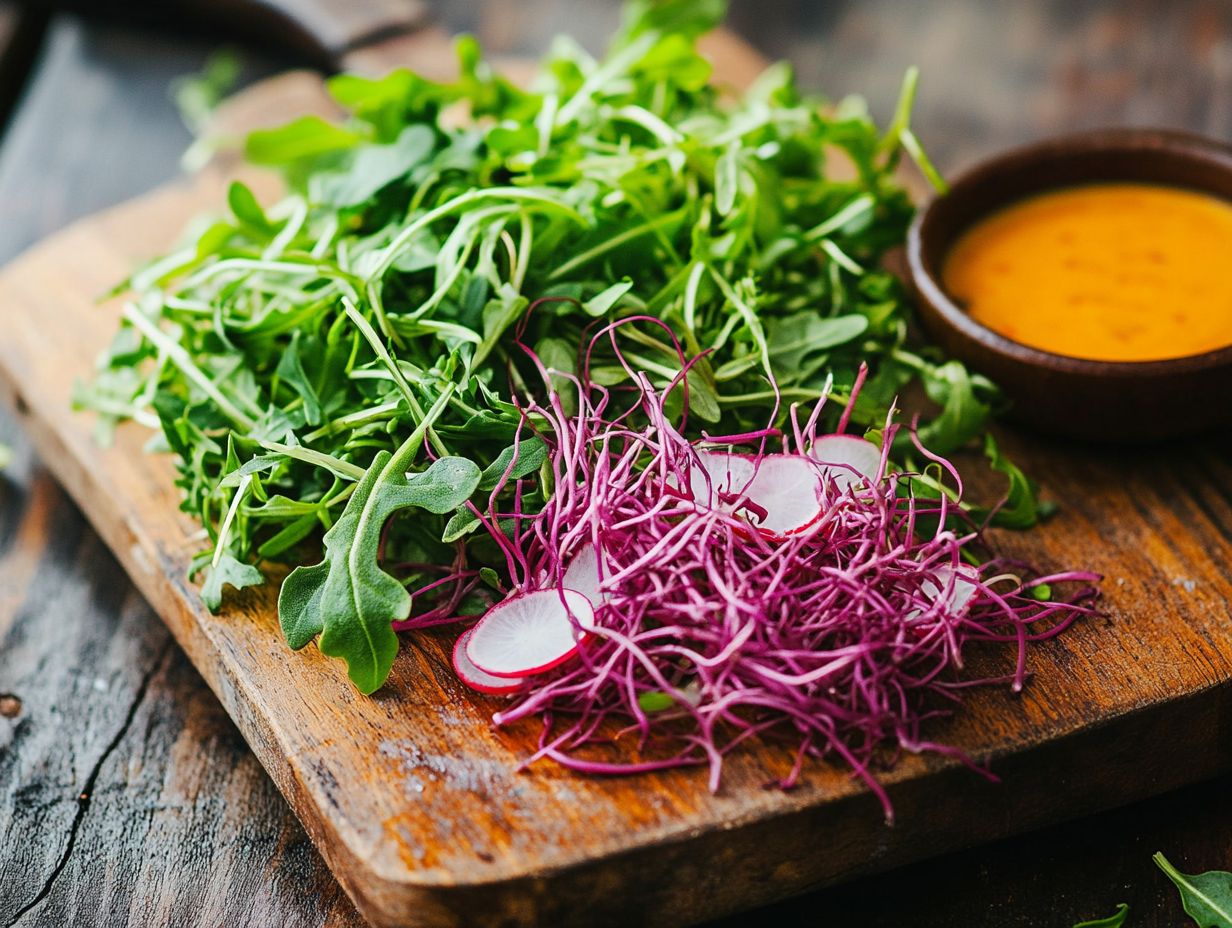
Creating delicious and nutritious meals with microgreens is a breeze! With an abundance of recipes and meal ideas at your fingertips, you can easily enhance your dishes. Vibrant salads and nutrient-packed smoothies are just the beginning microgreens can elevate the nutritional profile of any dish while offering a delightful blend of flavor and health benefits.
These tiny greens boast a diverse range of tastes, complementing various cuisines. For instance, add arugula microgreens to a zesty lemon vinaigrette for a peppery kick! Pea shoots lend a subtly sweet flavor to stir-fries and wraps, while the crunchy texture of radish microgreens makes them a perfect garnish for soups, enhancing both presentation and taste. Additionally, exploring microgreens and their role in a plant-based diet can further elevate your culinary experience.
Microgreens deliver a burst of flavor and pack a nutritional punch, brimming with vitamins, minerals, and antioxidants. Try adding them to breakfast bowls, grain salads, or savory omelets to showcase their versatility and add excitement to your everyday meals! For more insights, check out the science behind microgreens and health.
Precautions and Considerations
Though microgreens offer a wealth of health benefits, pregnant women must take specific precautions. Adhering to food safety measures is crucial before adding them to your diet.
These young plants can harbor harmful bacteria if not washed or sourced correctly. Ensuring their safety is vital for both your health and your baby’s!
It’s important to be mindful of any potential allergies or sensitivities you may have to particular microgreens to prevent any adverse reactions.
Food Safety and Allergies
Awareness of food safety and allergies is crucial when indulging in microgreens, especially for pregnant women who are more vulnerable to foodborne illnesses. Properly wash your microgreens and source them from reputable growers to significantly reduce the risk of contamination!
Rinse your microgreens under running water for at least 30 seconds to ensure safety. This simple step helps eliminate dirt and potential pathogens. Sourcing from local farms that follow organic growing practices boosts your confidence in the quality of these delicate greens.
If you have known sensitivities, it’s wise to avoid microgreens like radish or mustard, which are common allergens. Engaging in open conversations with growers about their handling methods can help reduce health risks, allowing you to savor the nutritious benefits of microgreens and explore the health benefits of growing your own microgreens with complete peace of mind.
Consulting with a Healthcare Provider
Talking to your healthcare provider about adding microgreens to your pregnancy diet is a smart move! These professionals can offer valuable insights tailored to your specific health needs, ensuring the addition of microgreens is beneficial.
Whether addressing allergies, nutrient deficiencies, or meal planning, your healthcare provider can deliver personalized advice that supports both your health and your baby’s.
Engage in open conversations about the potential benefits and risks associated with microgreens. Ask how these nutrient-dense greens may enhance your vitamin intake, bolster your immune health, or impact your digestive wellness. Additionally, consider the nutritional benefits of common microgreens in your discussions. Discuss any existing health conditions, like gestational diabetes or hypertension, to identify the best options for you.
This collaboration fosters a more informed approach to your dietary choices, ultimately promoting optimal health outcomes for both you and your baby.
Frequently Asked Questions
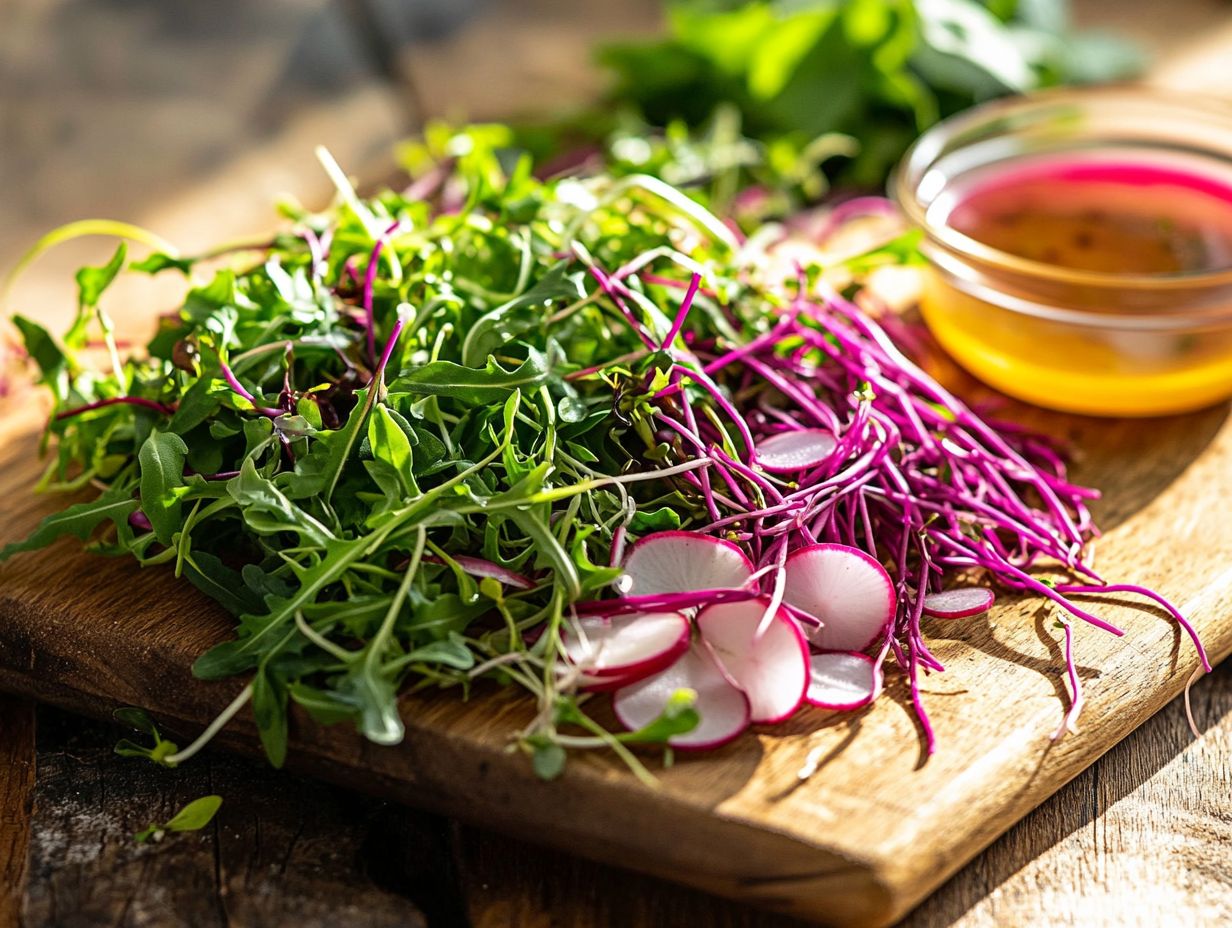
What are microgreens?
Microgreens are tiny, edible greens. They are harvested after the cotyledon leaves have sprouted, but before they fully mature into plants.
How do microgreens benefit pregnant women?
Microgreens provide essential vitamins and minerals for healthy fetal development. Folate is vital for preventing birth defects.
What specific nutrients do microgreens provide for pregnant women?
Microgreens are rich in vitamins A, C, and K. They also contain iron, calcium, potassium, and antioxidants that can support the immune system.
Are there any risks to consuming microgreens during pregnancy?
Microgreens are generally safe for pregnant women. Wash them thoroughly before eating to minimize the risk of foodborne illnesses.
Select organic or homegrown microgreens to avoid exposure to pesticides.
How can pregnant women incorporate microgreens into their diet?
You ll love how versatile microgreens are! They can be added to salads, sandwiches, or smoothies. They work well as garnishes or in soups and stews for added nutrition.
Are there any specific microgreens that are particularly beneficial for pregnant women?
Some microgreens offer specific benefits for pregnant women. For instance, broccoli microgreens are rich in folate and may help prevent birth defects.
Kale microgreens are a fantastic source of calcium, supporting bone health for both mother and baby.



